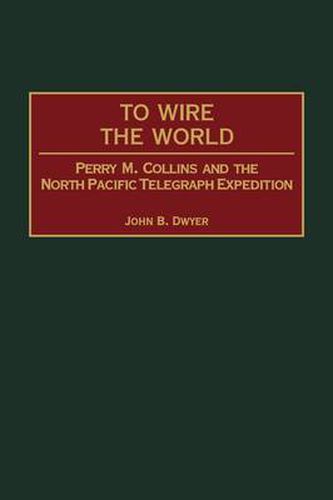Readings Newsletter
Become a Readings Member to make your shopping experience even easier.
Sign in or sign up for free!
You’re not far away from qualifying for FREE standard shipping within Australia
You’ve qualified for FREE standard shipping within Australia
The cart is loading…






In the 1850s, American entrepreneur Perry M. Collins envisioned a world connected by an overland telegraph line. Western Union shared his vision, and, with Russia and England willing to be partners in the venture, it seemed possible to complete the massive undertaking. This is the story of how Collins helped to deploy a telegraph army to British Columbia, modern day Alaska, and Siberia. Supported by a telegraph navy, these men surveyed, explored, and operated in dangerous-sometimes even life-threatening- environments to build the line from 1865 to 1867, only to have their attempts made obsolete by completion of the Atlantic cable in 1866.
Dwyer examines the geopolitical context, notions of manifest destiny, and the spirit of entrepreneurial adventure that motivated telegraph army commander, Col. Charles S. Burkley and his men. This story focuses on firsthand accounts by expedition participants and excerpts from ship’s log to fill this important gap in the history of communication. These men braved possible starvation and risked their lives in an ultimately futile attempt to make their vision a reality.
$9.00 standard shipping within Australia
FREE standard shipping within Australia for orders over $100.00
Express & International shipping calculated at checkout
In the 1850s, American entrepreneur Perry M. Collins envisioned a world connected by an overland telegraph line. Western Union shared his vision, and, with Russia and England willing to be partners in the venture, it seemed possible to complete the massive undertaking. This is the story of how Collins helped to deploy a telegraph army to British Columbia, modern day Alaska, and Siberia. Supported by a telegraph navy, these men surveyed, explored, and operated in dangerous-sometimes even life-threatening- environments to build the line from 1865 to 1867, only to have their attempts made obsolete by completion of the Atlantic cable in 1866.
Dwyer examines the geopolitical context, notions of manifest destiny, and the spirit of entrepreneurial adventure that motivated telegraph army commander, Col. Charles S. Burkley and his men. This story focuses on firsthand accounts by expedition participants and excerpts from ship’s log to fill this important gap in the history of communication. These men braved possible starvation and risked their lives in an ultimately futile attempt to make their vision a reality.